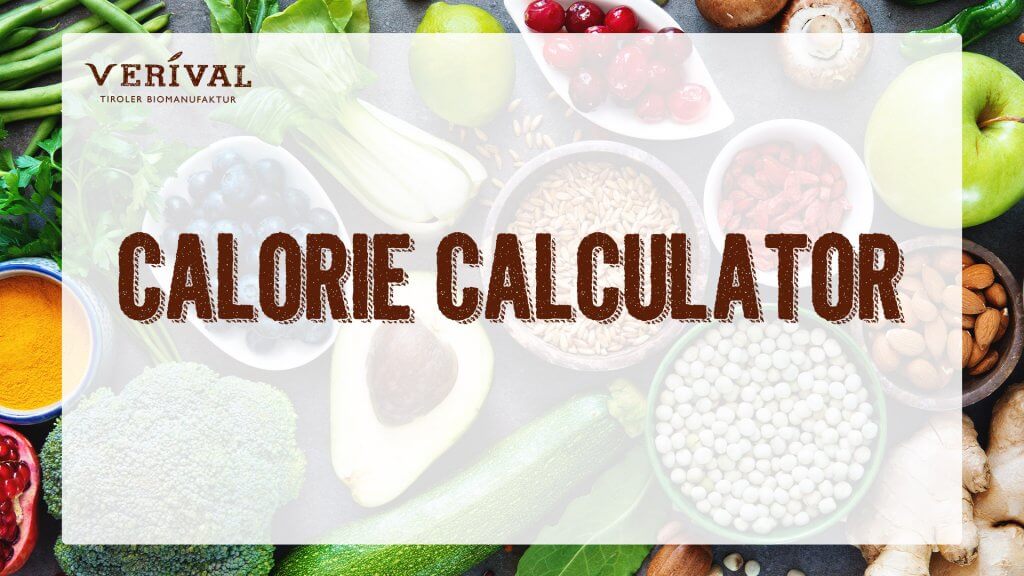
What are my calorie requirements to maintain weight? How much can I eat to lose weight? And what does your body consume per day?
You can easily find out with our calorie calculator. The article also tells you which foods will help you to lose weight.
Calculating calorie needs – Why is it useful to know your calories?
Whether you want to maintain your weight, gain or lose weight in a healthy way, the amount of calories you consume is always crucial for success.
Especially for athletes, knowing your calorie needs is important to achieve optimal training results and to improve performance.
Calorie requirements depend on several factors: Gender, height, age, sleep, body composition and especially the physical activities you perform during the day.
The more you move, the higher the calorie requirement. This means that the calorie requirement is not the same every day, but it is a good guideline for achieving success.
These tables show the different calorie requirements for women and men.

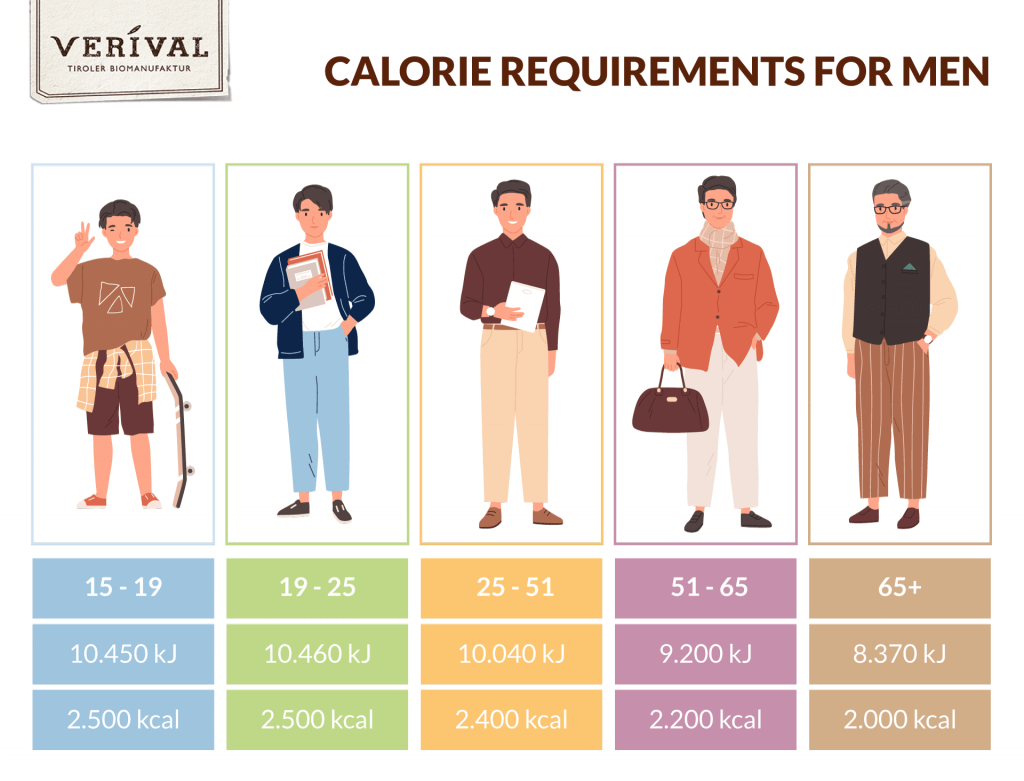
Calorie requirements for weight loss
The energy balance is always important for gaining or losing weight. If you consume exactly the amount of calories you need, you will maintain your weight.
However, if you want to lose weight, the calorie/energy balance must be negative, i.e. you must either eat below your daily calorie requirement or increase your calorie requirement through exercise, but leave your calorie intake unchanged.
The question often arises as to how many calories can be eaten if you want to lose weight in a healthy way. There is no universal number for this.
The starting point for your calculations is your individual total metabolic rate, also known as maintenance or daily calorie requirement, which you can determine very easily and quickly with a calorie calculator.
This is the amount of calories you need to maintain your weight. However, to lose weight you need to eat in a calorie deficit.
We recommend a daily deficit of 300 to a maximum of 500 calories so as not to put too much strain on the body, as it still needs energy (from food) to function and perform during the diet.
If the deficit is too great, fatigue, weakness, a feeling of cold, cravings, the yo-yo effect or mood swings will occur and, in the worst case, can lead to health problems.
It is better to start with a moderately high calorie deficit and increase it if you are not successful. This will make the transition easier and you won’t feel like you have to give up everything.
“I want to lose weight fast, what else can I eat?” This answer may surprise you, but hopefully it will even please you: You can eat anything. The decisive factor is the calorie balance.
As long as it is negative at the end of the day, you can lose weight. However, it is not good to eat only biscuits, crisps or chocolate, as these are less satisfying than other foods and have few health benefits.
In fact, there are foods that support weight loss and a calorie deficit – first and foremost oats.
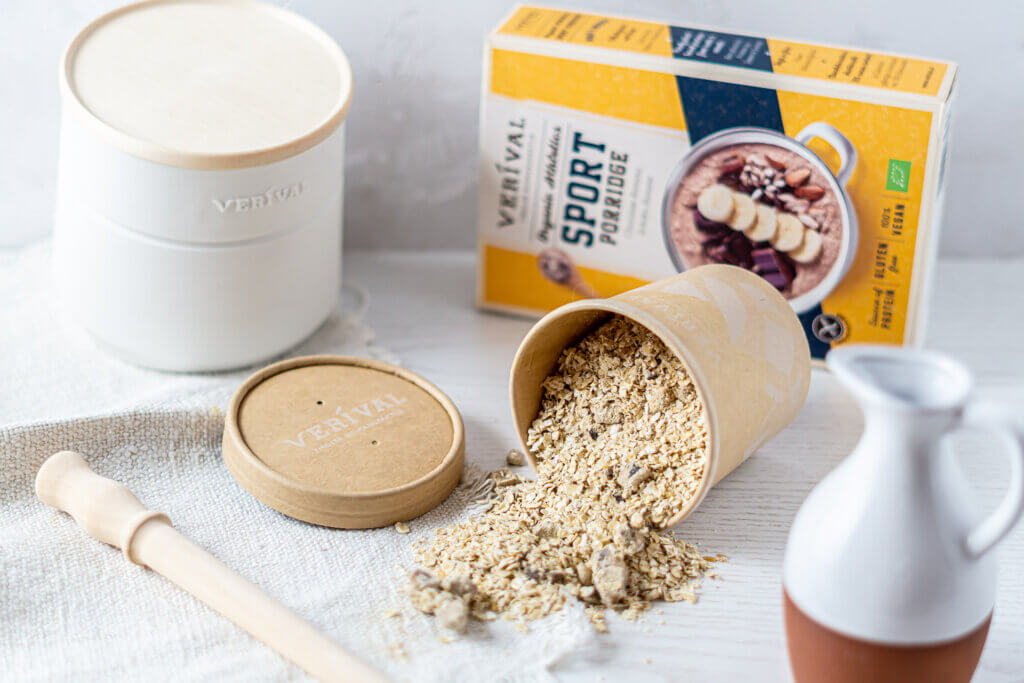
Oats are a whole grain, low in gluten and extremely rich in nutrients for a healthy diet. It is high in vitamins (B1 and B6), minerals (magnesium, iron, phosphorus, zinc) and the soluble fibre beta-glucan.
Beta-glucan regulates the blood sugar level, lowers the cholesterol level1 in the blood and ensures a long satiety2, as the dietary fibre swells strongly in the digestive tract.
This leads to a stronger stretching of the stomach wall, whose receptors consequently send the signal “satiety” to the brain earlier and stop food intake.
Furthermore, beta-glucan counteracts constipation and forms the food source for the bacteria contained in the intestine. This maintains a natural intestinal flora, which is important for digestion and general well-being.
Oats and oat products such as oat flakes can therefore help with weight loss, as they fill you up quickly and for a long time thanks to the fibre they contain and also the proteins. They keep the blood sugar level stable, which means that the feeling of hunger does not occur until later.
In addition to a balanced diet, your physical activities also play an important role in losing weight. The more you exercise, the higher your personal calorie requirement.
In addition to a calorie deficit, you can speed up your weight loss by walking or exercising.
However, make sure you don’t go below your basal metabolic rate, which we will discuss later, as this is counterproductive and not healthy for your long-term goals.
So if you don’t exercise much or at all and are just starting out, you may only need to reduce your calorie intake minimally, if at all, to lose weight.
How many calories do I need to build muscle?
Energy balance also plays a role in muscle building. If you eat more than your maintenance calories, you will gain weight. We recommend a daily calorie increase of about 300 calories for healthy weight gain.
Again, don’t get the extra energy purely from biscuits or unhealthy foods, but from healthy sources such as our nut or seed mixes.
The all-round talent oats can also help with gaining weight and building muscle, as the proteins they contain are important for muscle growth and the dietary fibres protect against constipation. Our sports mueslis in particular support you on your way.
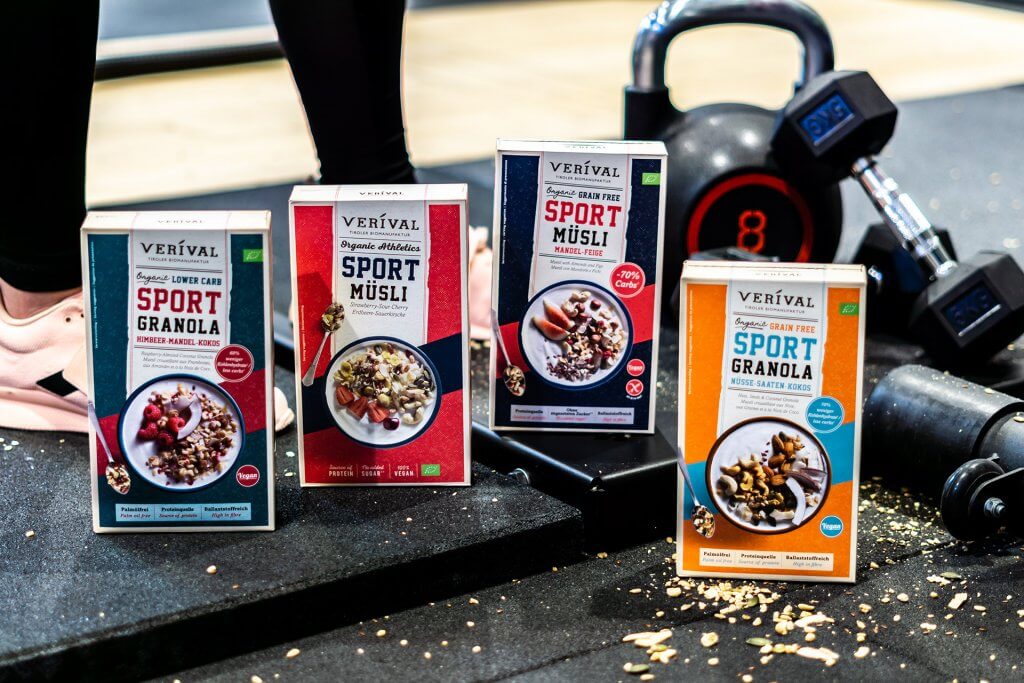
In order to be able to build up muscles in a targeted way, appropriate training is also important. Depending on the intensity of your training, you will need to adjust your calorie intake and possibly increase it further so that you don’t end up in a calorie deficit.
Calorie calculation – this is how your calorie requirement is calculated
The daily calorie requirement, also called maintenance requirement or total metabolic rate, is the sum of several components.
In simplified terms, however, it can be said that the total metabolic rate consists of the calculation of the basal metabolic rate and the performance metabolic rate.
What is the basal metabolic rate?
The basal metabolic rate is the energy that the body needs at rest to maintain all vital bodily functions and metabolic processes.
This means that even if you don’t move all day, your body still burns energy. You must therefore consume this value every day – even if you want to lose weight – because otherwise damage to your health can occur.
The basal metabolic rate is the same every day, but can increase if you have more muscle.
What does the power metabolism mean?
The power metabolic rate goes beyond the basal metabolic rate and refers to the energy that the body needs for physical activities.
This includes all everyday movements such as writing, talking, walking, cleaning, but also physically demanding activities such as sports.
The higher your basal metabolic rate, the higher your total metabolic rate or daily calorie requirement.
The power metabolic rate is variable compared to the basal metabolic rate. This means that if you exercise one day and spend the next day sitting, you will consume more energy on the first day.
As the average calorie consumption at the end of the week is more meaningful than the individual daily metabolic rate, it makes more sense to determine your average power metabolic rate with the PAL factor (Physical Activity Level).
How to determine your total metabolic rate
The total metabolic rate is the sum of the basal metabolic rate and the power metabolic rate. First calculate your basal metabolic rate, which is easy to calculate using the following rule of thumb:
- Men: GU (kcal/day) = 1 x kg body weight x 24
- Women: GU (kcal/day) = 0.9 x kg body weight x 24
For more accurate values, use the formula by Harris and Benedict (1919):
- Men: GU (kcal/day) = 66 + (13.8 x weight in kg) + (5.0 x height in cm) – (6.8 x age in years).
- Women: GU (kcal/day) = 655 + (9.5 x weight in kg) + (1.9 x height in cm) – (4.7 x age in years)
Then determine your power metabolic rate. For this, take the PAL factor from the following table that most closely matches your lifestyle:
| Physical Activity | PAL Factor |
| Exclusively sedentary/lying down | 1.2 |
| Exclusively sedentary, little or no leisure-time physical activity | 1.4-1.5 |
| Predominantly sedentary, walking or standing in between | 1.6-1.7 |
| Mostly walking or standing, moderate amount of sport | 1.8-1.9 |
| Physically demanding (occupational) activities | 2.0-2.4 |
For sportsmen and sportswomen who do 4-5 sports sessions per week of 30-60 minutes each, the PAL value can be increased by 0.3, since muscle work and regeneration also consume energy.
Finally, multiply your basal metabolic rate by the PAL factor to get your total metabolic rate or daily calorie requirement.
It is important to note that this figure is only a guideline and may vary slightly from day to day and may differ from your actual calorie requirements.
If you want to maintain your weight, you should eat about the same amount of calories every day for 2-4 weeks and check your weight weekly.
If you gained weight afterwards, the total calorie requirement was too high; if you lost weight, it was too low.
Calorie requirements for men and women
If calculating your daily calorie requirement with the formulas is too tedious for you and/or you only want to have an orientation anyway, you can take your approximate calorie requirement from the following table.
Note that these values are averages and do not take into account height, age or body composition!
| Physical activity per day | Calorie requirement men | Calorie requirement women |
| < 30 minutes | 2100-2500 kcal | 1800-2000 kcal |
| 30 < 60 minutes | 2500-2700 kcal | 2000-2200 kcal |
| > 60 minutes | 3000-3500 kcal | 2400-2800 kcal |
The calorie requirements of men differ from those of women. Men have a higher calorie requirement due to body composition. A man has a higher percentage of muscle but a lower percentage of body fat.
Since muscles increase the metabolic rate, the basal and consequently the total metabolic rate increases.
Nutritional recommendations for a healthy breakfast
The first meal of the day plays a big role in your energy level during the day. Therefore, you should not skip this meal, even if you want to lose weight.
It is important that your breakfast is balanced, which means that it contains the following food components:
Carbohydrates: preferably from whole-grain products such as bread or whole-grain cereals such as oatmeal. They provide energy, fill you up and give you enough fibre.
Fat and protein from milk and dairy products, eggs, soy drink/yoghurt or nuts and seeds. In particular, nuts such as walnuts, cashews and seeds such as chia and flax seeds are a recommended ingredient for your breakfast.
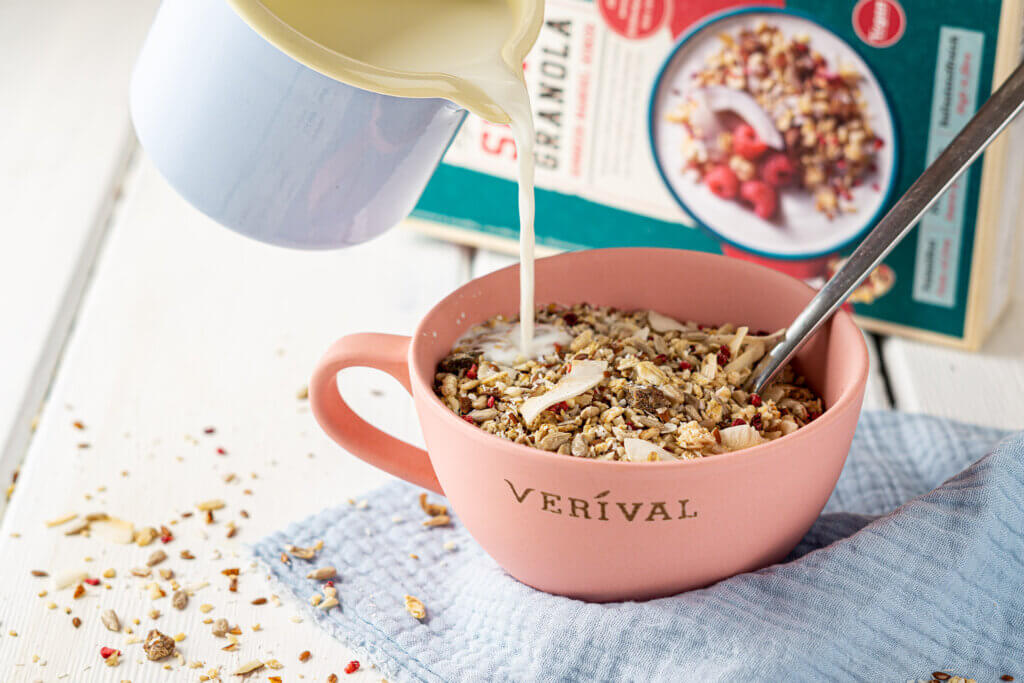
Not only do they provide lots of plant-based protein, but they also contain the vital unsaturated omega-3 fatty acids. These protect against inflammation and heart disease and keep you focused.
Vitamins from fresh fruit and vegetables if possible, or from dried fruit. Pay attention to the quality and that the products are seasonal. Then they contain the most vitamins and minerals.
Don’t forget to drink enough fluids. Water and unsweetened fruit and herbal teas are best.
For a balanced breakfast, try our mueslis and oatmeals. These contain lots of carbohydrates and fibre and can be prepared with milk or yoghurt (proteins).
Add fresh fruit (vitamins) and nuts (fat) and you’re guaranteed a healthy start to the day with your first meal.
- 1.Othman RA, Moghadasian MH, Jones PJ. Cholesterol-lowering effects of oat β-glucan. Nutrition Reviews. Published online June 2011:299-309. doi:10.1111/j.1753-4887.2011.00401.x
- 2.Rebello CJ, O’Neil CE, Greenway FL. Dietary fiber and satiety: the effects of oats on satiety. Nutr Rev. Published online January 2, 2016:131-147. doi:10.1093/nutrit/nuv063





